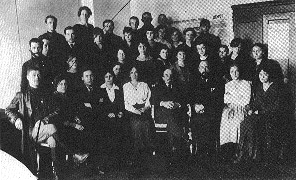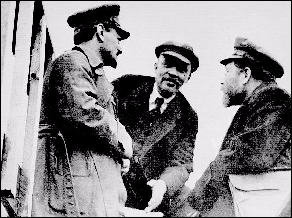Bolshevik
|
|
Bolshevik-meeting.jpg
A Bolshevik ("Большеви́к", derived from a Russian word loosely translated as "majority") was a member of a faction of Bolsheviks of the Russian Social Democratic Labor Party (RSDLP), a Marxist political party. Bolsheviks led by Vladimir Lenin seized power in Russia in 1917, a world-historical event known as the October Revolution.
The other faction of the RSDLP was known as the Mensheviks, derived from "minority". The split into two factions occurred at the Second Party Congress in 1903. After the split, the Bolshevik party was designated as RSDLP(b) (Russian: РСДРП(б)), where "b" stands for "Bolsheviks".
Shortly after the Bolsheviks seized power during the Russian Revolution of 1917, they changed their name to the All-Russian Communist Party (Bolsheviks) in 1918 and were generally known as the Communist Party after that point. However, it was not until 1952 that the party formally dropped the word Bolshevik from its name. (See Congress of the CPSU article for the timeline of name changes.)
The word "Bolshevik" is sometimes used as a synonym of Communist. It was often used by right-wingers outside the Soviet Union as a derogatory term for left-wingers, not all of whom were necessarily Communists. The Bolshevik political platform has often been referred to as Bolshevism.
| Contents [hide] |
Origins
At the 2nd Congress of the RSDLP, held in Belgium in 1903, Lenin put forward his ideas on the question of organizing the party on a democratic centralist model as a small party of "professional revolutionaries" who actively worked to overthrow the Tsarist government. (Lenin's arguments are expressed in the essay One Step Forward, Two Steps Back.) His opponents, notably Julius Martov, favored a more open membership policy, where anyone in agreement with the party's goals could join, even if they did not actively work for revolution. Lenin lost, by a vote of 28 to 23, and the party split over the issue. The faction supporting Lenin became the Bolsheviks, and those who preferred Martov's model became the Mensheviks. Lenin's faction took the name Bolshevik (derived from the Russian word bol'she (больше) meaning "more" or "bigger") despite losing the vote and actually being the numerically smaller faction. It can be explained from the fact that they had won a vote at the congress on the composition of the Iskra editorial board. Though the term Bolshevik originated due to a procedural vote, it acquired an additional connotation as Lenin's faction "wanted more", i.e. were more radical than Mensheviks, who "wanted less". This was the way the terms were generally understood abroad. In English, for instance, the press for a number of years translated "Bolsheviks" as "Maximalists" and "Mensheviks" as "Minimalists".
The two factions of the RSDLP attempted to reunify in 1907, and maintained the fiction that they were one party for several more years. The factions permanently broke off relations after the Bolsheviks failed in an attempt to take over the RSDLP in 1912. As a result, they ceased to be a faction in the RSDLP and instead declared themselves an independent party though they retained the name RSDLP (Bolshevik).
The Bolsheviks believed in organizing the party in a strongly centralized hierarchy that sought to overthrow the Tsar and achieve power. Although the Bolsheviks were not completely monolithic, they were characterized by a rigid adherence to the leadership of the central committee, based on the notion of democratic centralism. The Mensheviks favored open party membership and espoused cooperation with the other socialist and some non-socialist groups in Russia. Bolsheviks generally refused to co-operate with liberal or radical parties (which they labeled "bourgeois") or even eventually other socialist organizations, although Lenin sometimes made tactical alliances.
Leon Trotsky was initially a Menshevik in 1903 but soon became an independent and was not a member of either faction until 1917. In that year he lined up behind Lenin and became a Bolshevik after the February Revolution, as he came to believe that events were confirming Lenin's analysis.
The Bolsheviks played a minor role in the 1905 revolution, and were a minority in the St. Petersburg Soviet of Workers' Deputies led by Trotsky. The less significant Moscow soviet, however, was dominated by the Bolsheviks. These soviets became the model for the soviets that were formed in 1917.
During the First World War, the Bolsheviks took an internationalist stance that emphasized solidarity between the workers of Russia, Germany, and the rest of the world, and broke with the Second International when its leading parties ended up supporting their own nations in the conflict.
1917 Revolutions
The February 1917 revolution came about when Tsar Nicholas II attempted to dissolve the Duma only to have the body reject the action and declare a provisional government. The Tsar abdicated leaving the provisional government in control.
While the Mensheviks and other moderate socialists believed that an industrially backwards country such as Russia could not hope to achieve socialism and that the tasks of the revolution was therefore to complete the country's transformation to liberal capitalism, the Bolsheviks believed that Russia could be the spark that would lead Europe to a socialist transformation of society and did not attempt to moderate their program.
Lenin and other exiled Bolsheviks returned from exile. The Petrograd Bolshevik Party had been under the control of Stalin who supported the provisional government. Lenin opposed this line in his April Theses and the Bolsheviks became opponents of the government with slogans of All Power to Soviets and Bread, Peace and Land which attempted to appeal to the urban working class, soldiers, and to Russia's huge peasant population. Some radical Mensheviks, such as Trotsky joined the Bolsheviks at this point. Stalin changed his position and decided to support Lenin's line.
On July 19, the Kerensky government ordered the arrest of the Bolshevik leadership. Lenin escaped capture, went into hiding, and wrote State and Revolution, which outlined his ideas for a socialist government.
The repression against the Bolsheviks ceased when the Kerensky government was threatened by a rebellion led by General Kornilov. The Bolsheviks enlisted a 25,000 strong militia to defend Petrograd from attack and reached out to Kornilov's troops, urging them not to attack. They stood down and the rebellion fizzled with Kornilov being taken into custody.
During this period a situation of dual power developed. While the legislature and provisional government were controlled by Kerensky in coalition with the Mensheviks and the Socialist Revolutionary Party, the workers' and soldiers' soviets were increasingly under the control of the Bolsheviks.
On October 10, the Bolshevik Central Committee established a smaller Politburo to run party affairs due to the increased demands on the party for day-to-day direction. Bubnov, Zinoviev, Kamenev, Lenin, Sokolnikov, Stalin and Trotsky were elected to the body which operated for two weeks and dissolved on October 25, 1917, once the Bolsheviks had taken power in the October Revolution.
The Central Committee of the Bolsheviks had been debating whether to call for an insurrection. Lenin urged the Bolsheviks to overthrow the Provisional government. Zinoviev and Kamenev were the only members of the Central Committee to disagree. They took the unusual step of making their objections public in the pages of Pravda an act that very nearly got them expelled from the party for breaching party discipline.
When Kerensky moved against the Bolsheviks on October 22 by ordering the arrest of their Military Revolutionary Council, banning the Bolshevik newspaper and cutting off telephone lines to the Bolshevik headquarters in the Smolny Institute, Trotsky urged that the Bolsheviks' decision on overthrowing the government be put into action. Lenin concurred and on October 24, orders were issued for the Bolsheviks' Red Guards to occupy key locations in the city and surround the Winter Palace where the Provisional government had its headquarters.
The Bolsheviks raised the slogan All power to the soviets meaning that the country should be run by the workers and soldiers councils and not the constituent assembly.
On October 26, 1917 the All-Russian Congress of Soviets met and handed power over to a Soviet Council of People's Commissars with Lenin as chairman, Trotsky as commissar of the Red Army and minister of foreign affairs and Bolsheviks taking the other positions of what was the new government of the country.
In March 1918, the Seventh Party Congress of the Social Democratic and Labor Party (Bolsheviks) met and, at Lenin's urging, changed the name of the party to the All-Russian Communist Party (Bolsheviks). After the name change, however, the party was generally known as the Communist Party with the name Bolshevik referring to the party prior to 1918.
Related articles
- Marxism
- List of socialists - Bolsheviks
- Soviet Union
- History of the Soviet Union
- Russian Revolution, also known as the Bolshevik Revolution.
- Communist Party of the Soviet Union
- History of the Jews in Russia and Soviet Union
- Yevsektsiya
- Enemy of the people
- Old Bolshevik
External links
- Twenty Years in Underground Russia: Memoirs of a Rank-and-File Bolshevik (http://www.marxists.org/history/archive/bobrovskaya/twenty-years/), by Cecilia Bobrovskaya
- Bolshevism, the Road to Revolution (http://www.marxist.com/bolshevism/), by Alan Woods
- The Bolsheviks and Workers Control (http://www.spunk.org/texts/places/russia/sp001861/bolintro.html/), by Maurice Brinton
- Pathfinder Books, Communist bookstore online (http://www.pathfinderpress.com)ca:Bolxevisme
da:Bolsjevik de:Bolschewiki es:Bolchevique eo:Bolŝeviko fr:Bolchevik nl:Bolsjewieken ja:ボリシェヴィキ no:Bolsjevik nn:Bolsjevik pt:Bolchevique ro:Bolşevic simple:Bolshevik fi:Bolševikit sv:Bolsjevik tr:Bolşevik zh:布尔什维克


